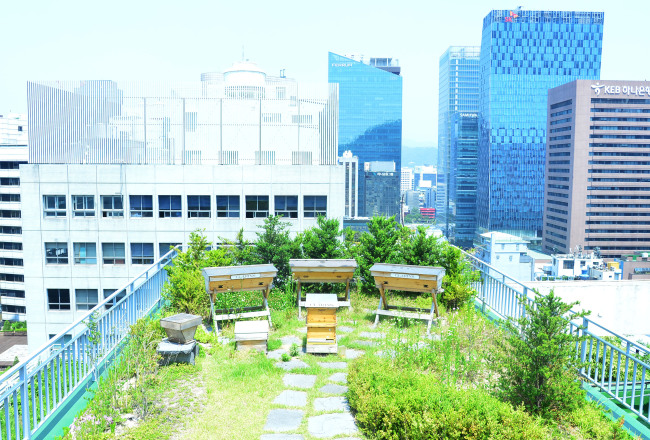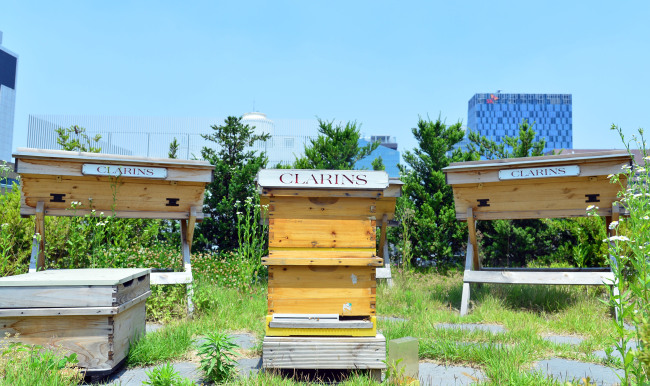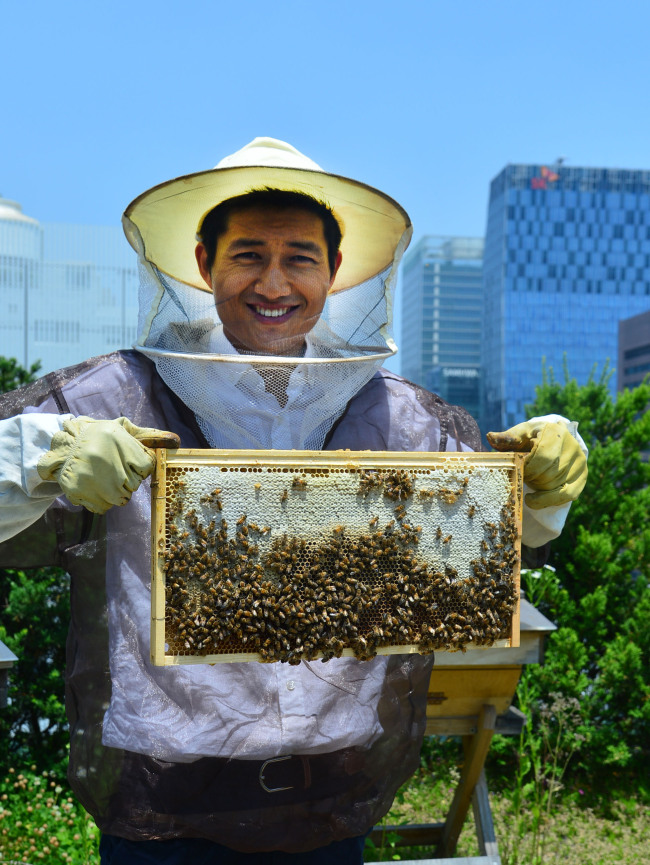The greening of rooftops in Seoul does not just benefit people, it provides the chance to protect a species threatened by humans – the honey bees.
The growing number of rooftop gardens and farms is an opportunity to strengthen the city’s ecosystem by protecting the habitats of honey bees, said Park Jin, the founder of the social enterprise Urban Bees Seoul, which was established in 2013. He was speaking to The Korea Herald at the rooftop of the UNESCO House in Myeong-dong where several apiaries are located.
 |
Rooftop apiary at UNESCO House in Myeong-dong, which is run by social enterprise Urban Bees Seoul. (Yoon Byung-chan/The Korea Herald) |
The organization aims to strengthen the ecosystem by running small apiaries in urban areas. The bees will help the reproduction of flowers and trees, which in turn results in better environments for the bees and insects, thereby attracting more of them, explained Park.
To achieve this goal, the company runs programs such as training for urban bee keepers, urban afforestation and educational programs for children to raise public awareness of its projects.
“Greener is not always better for bees. It could be a green desert,” said Park, emphasizing the importance of plants that cater to bees.
 |
Rooftop apiary at UNESCO House in Myeong-dong, which is run by social enterprise Urban Bees Seoul. (Yoon Byung-chan/The Korea Herald) |
The social enterprise’s ultimate goal is to create a “honey bee forest” full of plants that cater to bees, said Park, pointing out that current efforts to make the city greener focus mainly on cooling down the city, neglecting the need to coexist with other species.
Coexistence
To raise awareness of such coexistence, the company launched “Honey Bank,” a crowdsourcing project which allows people to invest in bees and later receive honey collected from rooftop apiaries, explained Park.
“We encourage people to invest in bees, not honey, so they can take part in saving honey bees and protecting their habitat,” said Park, adding that the project promotes value-conscious consumption, not just buying a jar of honey.
 |
Park Jin, founder of social enterprise Urban Bees Seoul, holds a beehive at the rooftop apiary located on the roof of UNESCO House in Myeong-dong on May 30. (Yoon Byung-chan/The Korea Herald) |
Despite difficulties in finding places for apiaries in the city due to the prevailing fear of bees, there are 25 urban apiaries in operation, said Park. Urban Bees Seoul created an urban forest in partnership with CJ Korea Express in 2014. A 20,000 square-meter forest near Jamwon Hangang Park, a partnership between the social enterprise and the Seoul government, will be completed by the end of July.
Park says that we need to put ourselves in the position of honey bees. “They inhabited these areas before us, and we took up their habitat and transformed it into human-friendly settings,” he said.
“We should think more about ways to live in harmony with all species,” said Park, adding that it would make the world a better place for human beings as well.
By Jung Eun-jin (
jej2403@heraldcorp.com)







![[Weekender] Korea's traditional sauce culture gains global recognition](http://res.heraldm.com/phpwas/restmb_idxmake.php?idx=644&simg=/content/image/2024/11/21/20241121050153_0.jpg)


